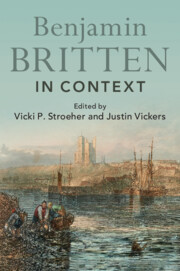Book contents
- Benjamin Britten in Context
- Composers in Context
- Benjamin Britten in Context
- Copyright page
- Dedication
- Contents
- Figures
- Tables
- Notes on Contributors
- Acknowledgements
- Bibliographic and In-Text Abbreviations
- Prologue
- Part I The Britten Circle(s)
- Part II British Musical Life
- Part III Britten and Other Composers
- Chapter 17 The Compositional Context
- Chapter 18 Responding to a British Musical Past
- Chapter 19 Britten and the English Musical Renaissance
- Chapter 20 Responding to the Continent
- Chapter 21 An English Tradition?
- Chapter 22 ‘An Exciting Time with All the Russians’
- Chapter 23 The Avant-Garde
- Part IV Wordsmiths, Designers, and Performers
- Part V British Sociocultural, Religious, and Political Life
- Further Reading
- Index
Chapter 19 - Britten and the English Musical Renaissance
from Part III - Britten and Other Composers
Published online by Cambridge University Press: 31 March 2022
- Benjamin Britten in Context
- Composers in Context
- Benjamin Britten in Context
- Copyright page
- Dedication
- Contents
- Figures
- Tables
- Notes on Contributors
- Acknowledgements
- Bibliographic and In-Text Abbreviations
- Prologue
- Part I The Britten Circle(s)
- Part II British Musical Life
- Part III Britten and Other Composers
- Chapter 17 The Compositional Context
- Chapter 18 Responding to a British Musical Past
- Chapter 19 Britten and the English Musical Renaissance
- Chapter 20 Responding to the Continent
- Chapter 21 An English Tradition?
- Chapter 22 ‘An Exciting Time with All the Russians’
- Chapter 23 The Avant-Garde
- Part IV Wordsmiths, Designers, and Performers
- Part V British Sociocultural, Religious, and Political Life
- Further Reading
- Index
Summary
Britten’s relationship to his predecessors and contemporaries in the ‘English Musical Renaissance’ was complicated. He found the Royal College of Music parochial and amateurish, and was frustrated by composition lessons there with John Ireland, not least in comparison to his private study with Frank Bridge. He largely rejected the influence of English folk traditions and Tudor music important to the ‘pastoral school’, favoring the more cosmopolitan example of Bridge, and his own exploration of continental European modernism. Britten’s view of composers such as Vaughan Williams as insular and regressive has shaped the historiography of British music in ways that still reverberate today. Scholars have typically taken such attitudes at face value; but this obscures a more complex reality, in which the composer attempted to annex and reimagine, rather than simply reject, core achievements of his predecessors, incurring conceptual if not direct stylistic debts to them. In the case of Holst in particular, whom Britten came to embrace in later life, insufficient attention has been paid to this legacy.
Keywords
- Type
- Chapter
- Information
- Benjamin Britten in Context , pp. 163 - 170Publisher: Cambridge University PressPrint publication year: 2022

